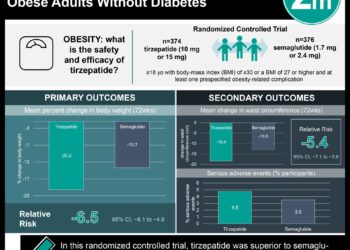Low aerobic exercise capacity and high BMI associated with risk of hypertension
1. In this retrospective cohort, low aerobic exercise capacity and high body mass index (BMI), but not muscular strength, were associated with increased risk of hypertension in adulthood.
2. Low aerobic capacity also influenced the risk of hypertension, even among males with normal BMIs.
Evidence Rating Level: 2 (Good)
Study Rundown: Hypertension is common among adults in North America, and is associated with increased risk of heart disease, stroke and kidney disease. Established modifiable risk factors for hypertension include high BMI and low physical activity. This study aimed to examine the interactive effects of physical fitness and BMI in late adolescence in association with the risk of hypertension in adulthood.
Low aerobic exercise capacity and high BMI (overweight or obese) were independently associated with increased risk of hypertension, independent of family history or socioeconomic status. Muscular strength was not significantly related to risk of hypertension. Low aerobic capacity also influenced risk of future hypertension even among those with normal BMIs. High BMI and low aerobic capacity resulted in the highest risk of adulthood hypertension. Strengths of this study include having a large population sample with adequate ability to follow outcomes given the availability of information. However, this study was completed on a homogenous, Swedish, male-only population and thus generalizability to North Americans and females may be hindered.
Click to read the study, published today in JAMA Internal Medicine
Relevant Reading: Joint Effects of Physical Activity and BMI on Risk of Hypertension in Women: A Longitudinal Study
In-Depth [retrospective cohort]: This study’s cohort consisted of all Swedish military conscripts from January 1969 to December 1997, translating to 98% of all 18 year old men nationwide. They were followed until December 2012. All military conscripts underwent examination recording the man’s BMI and testing of their aerobic exercise capacity and muscular strength. Those with previous hypertension were excluded. Using the Swedish Hospital and Outpatient Registries, the diagnosis for essential hypertension was identified. Statistical analysis included Poisson regression to calculate incidence rate ratios (IRR). Models were adjusted for year conscription examination, family history of hypertension, educational level and neighborhood socioeconomic status.
Over 1.5 million men were included in the cohort, of which 6% (93,035) were subsequently diagnosed with hypertension during 39.7 million person-years of follow-up (mean follow-up 25.7 years). The median age of participants at hypertension diagnosis was 49.8 years. Low aerobic capacity and high BMI were significantly associated with increased risk of hypertension. The IRR for developing hypertension for overweight (BMI ≥ 25) and obese (BMI ≥ 30) compared to normal BMI (≤ 24.9) was 2.51 (95%CI 2.46-2.55, p < 0.001). Aerobic capacity, lowest vs. highest tertile had an IRR of 1.50 (95%CI 1.47-1.54; p < 0.001). Combination of high BMI and low aerobic exercise had the highest risk of hypertension (IRR 3.53 95%CI 3.41-3.66; p < 0.001), although it was less than an expected additive or multiplicative interaction between these two variables (p < 0.001).
Image: PD
©2016 2 Minute Medicine, Inc. All rights reserved. No works may be reproduced without expressed written consent from 2 Minute Medicine, Inc. Inquire about licensing here. No article should be construed as medical advice and is not intended as such by the authors or by 2 Minute Medicine, Inc.







